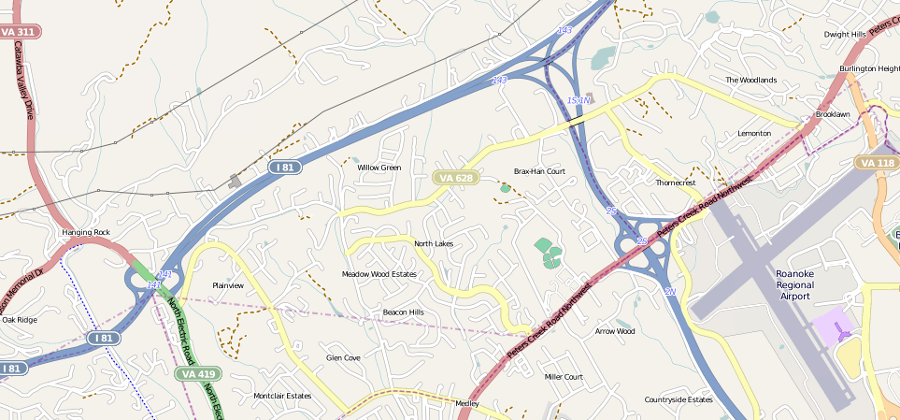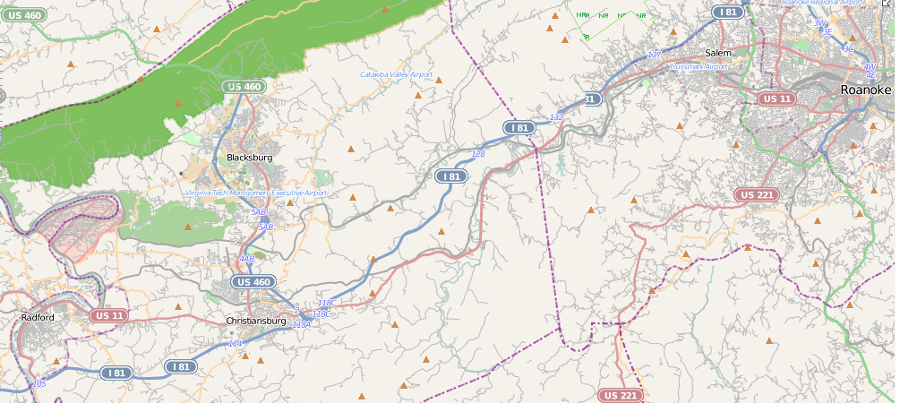
the Roanoke airport is easily accessible from I-81
Source: ESRI, ArcGIS Online
In the old days, the transportation and manufacturing sectors of the economy were essential for most Virginia cities to grow. Today, a city needs to have both a university and an airport. As the economy has shifted to "services" that rely upon trained employees and high-tech innovation, businesses look for university partners to be located nearby before investing in new facilities in a community.
Growth associated with colleges and universities is not a new experience in Virginia. Charlottesville, Farmville, and Ashland grew not only because they were railroad depots, but also because they were home to the University of Virginia, Longwood College, and Randolph-Macon College. Staunton benefitted from Mary Baldwin College, and Fredericksburg from Mary Washington.
Lexington developed where the Great Wagon Road (which became US11, then was paralleled by I-81) crossed the Maury River. It was a port near the western extremity of the James River and Kanawha Canal, but Lexington grew largely because of the Virginia Military Institute and Washington and Lee University.
Radford developed initially as the location for a ferry (Ingles Ferry) across the New River. Its growth was enhanced by being a depot on the Virginia and Tennessee Railroad , and today it thrives because of Radford University.
Radford is the home of metal-bending foundries with high-wage employees, and the sounds of railroad cars being shuffled in the railyard fill the night. Still, the city appears empty when the students are home on vacation. Stores in downtown find it a challenge to stay in business if they sell exclusively to the transitory student population, while at the same time the merchants also struggle if they sell to just the small population of locals residents.
20 minutes away from Radford is Blacksburg, Virginia's largest town. It exists because of Virginia Tech, founded in 1972 as one of Virginia's two land grant universities. Blacksburg offers businesses a critical mass of students who serve as customers. A quick walk through downtown will show that record stores, restaurants, and a Kinkos copy center can survive off the university trade alone in Blacksburg, in contrast to smaller Radford.
Roanoke is the largest Virginia city without a large university. Hollins and Roanoke College are located there, but they are small schools. (When Roanoke College moved to Roanoke, all the physical property of the school fit in one wagon.) Virginia Tech is 45 minutes away, but it is in Montgomery County and perceived to be outside the Roanoke area. One factor stimulating some in Roanoke to support the "smart road" and I-73 is the idea that Virginia Tech could be 20 minutes closer via Interstate. "Greater Roanoke" would then include a world-class university as well as an airport, civic center, and all the other characteristics of a dynamic urban area that could attract new business.

In Northern Virginia, Dulles and Reagan National airports provide the essential transportation links. The region has a wealth of universities vying to serve as the intellectual center. For example, George Washington University started to build a campus in Loudoun County, and both Virginia Tech and the University of Virginia have an annex in Falls Church. However, it appears George Mason University has emerged as the winner in the competition in Northern Virginia.
GMU was originally a satellite college of the University of Virginia. It received far less state funding per pupil than other state universities, in part because it had fewer alumni serving in the General Assembly. In the 1980's, land developers such as "Til" Hazel donated enough money to launch GMU into the top tier of universities. The financial endowments for Robinson professors, and for hiring luminaries that had served in the Reagan administration, were based on the real estate profits generated as farms were converted to subdivision and shopping centers before the Internet.
Thanks to the support of those generous contributors, and a conscious desire of the state to link GMU to the New Economy based on telecommunications and computers, George Mason is well-positioned to expand and spur further economic growth in northern Virginia.